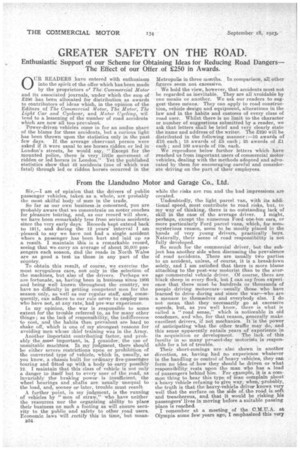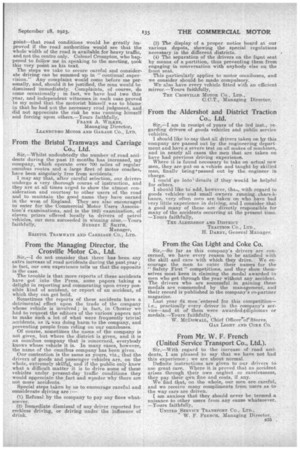From the Llandudno Motor and Garage Co., Ltd.
Page 16

Page 17

If you've noticed an error in this article please click here to report it so we can fix it.
Sir,—I am of opinion that the drivers of public passenger vehicles taken as a whole, are probably the most ekilful body of men in the trade. So far as our own business is concerned, you are probably aware that we concentrate on motor coaches for pleasure tiAring, and, as our record will show, we have been remarkably free from serious accidents since the very early days. Records kept extend hack to 1911, a,ndi during the 12 years' interval .1 am pleased ta say we have not had a single accident where a. passenger has been hurt and laid up as a result I maintain this is a remarkable record, seeing that we carry an average of about 30,000 passengers each season, and the roads in North Wales are as good a test as those in any part of the country.
To obtain this result, of course, we exercise the most scrupulous care, not only in the selection of the machines, but also of the drivers. Perhaps we are fortunate, as, having been in business since 1906 and being well known throughout the country, we have no difficulty in getting competent men for the season only, as well as our regular staff, and, consequently, can adhere ti> our rule never to employ men who have not, at any rate, had pre-war experience.
En my opinion, the war is responsible to some extent for the trouble referred to, as for many other things; as the lack of responsibility, the indifference to cost, and the habits then prevalent are. hard to shake off, which is One of my strongest reasons for avoiding men whose ehief training was in the Army.
Another litiportant contributing factor, and probably.the most. important, is, I consider, the use of unsuitable rnaclitnes. Tn my jinteutent, there 'should be either severe restrictions upon or prohibition of the converted typO of -vehicle, which is, ueuarly, as you know, a chassis built for ordinary five-passenger touring and fitted -ap with a body to carry possibly 12. I maintain that this class of vehicle is not only a danger to itself but to every user of the road, as invariably the braking power is insufficient, the wheel bearings and _shafts are usually unequal to the load, and, sooner or later, trouble must result A further point, in my judgment, is the running of vehicles by "men of straw, who have neither the resources nor the organizing ability to place. their business on such a footing as will ensure security to the public and safety to other road users. Economic laws will _rectify this in time, but mean
B34 . while the risks are run and the bad impressions are created.
Undoubtedly, the light parcel van, with its additional speed, must contribute to road risks, but, to my way' of thinking, there is no outstanding lack of skill in the case of the average driver. I might, perhaps, except the numerous Ford •one-ton cars, or more particularly Ford parcel vans, which, for some mysterious reason, seem to be mostly placed in the hands of very young drivers, practically boys. Naturally, their sense of road responsibility is not fully developed.
So much for the commercial driver, lant the subject has another side when discussing the prevalence of road accidents. There are usually two parties to an accident, unless, of course, it is a breakdown solely, and I am satisfied that there is more blame attaching to the post-war motorist than to the average commercial vehicle driver. Of course, there are black sheep in every flock, but I can say from experience that there must he hundreds or thousands of people driving motorcars—usually those who have learned to drive during and since the war—whoare a menace to themselves and everybody else. I do not mean that they necessarily go at excessive speeds, but, as you well know, there is what is called a" road sense,' which is noticeable in old coachmen, and who, for that reason, generally make excellent drivers, if not mechanics. It:is the power of anticipating what the other traffic may do, and this sense apparently entails years of experience in its acquisition or development. The lack of this faculty in so many present-day motorists is responsible for a lot of trouble. Their short-comings are also shown in another direction, as, having had no experience whatever in the handling or control of heavy vehicles, they can form no idea of how they should he driven or what responsibility rests upon the man who has a load of passengers behind him, For example, it is a cornm.on thing to hear this type of man complain about a heavy vehicle refusing to give way, when,probably, the truth is that the heavy-vehicle driver knows very well that the surface an the side of the road is_ soft and treacherous, and, that it would be risking his passengers' lives in moving before a suitable passing place is reached. I remember at a meeting of the 0.M.U.A. at Olympia some few years ago, I emphasized this very point—that road conditions would be greatly improved if the road authorities would see that the whole -width of the road is available for heavy traffic, and not the centre only. Colonel Crompton, who happened to follow me in speaking to the meeting, took this very point as his text.
The steps we take to secure careful and considerate driving can be summed up in "continual supervision." Any complaint would come before me personally, and, should it be justified, the man would be dismissed immediately. Complaints, of course, do come occasionally ; in fact, we have had two this year, and independent witnesses in each case proved to my mind that the motorist himself was to blame in that he had not the necessary road judgment, and did not appreciate the risk he was running himself and forcing upon others.—Yours faithfully, FRANK A. WILKES, Managing Director, LLANDUDNO MOTOR AND GARAGE CO., LTD.
From the Bristol Tramways and Carriage Co., Ltd.
Sir,—Whilst undoubtedly the number of road accidents during the past 12 months has increased, my company, which operate over 700 miles of regular omnibus routes and a large fleet of motor coaches, have been singularly free from accidents. I may say that, after careful selection, our drivers undergo a very thorough course of instruction, and they are at all times urged to show the utmost consideration and courtesy to other users of the road and to maintain the good name they have earned in the west of England. They are also encouraged ta enter for the Commercial Motor Users Association's examinations, and in the 1923 examination, of eleven prizes offered locally to drivers of petrol vehicles, our men succeeded in winning nine.—Yours faithfully, SYDNEY E. &Inn, Manager, BRISTOL TRAMWAYS AND CARRIAGE CO., LTD.
From the Managing Director, the Crosville Motor Co., Ltd.
Sir,—I do not consider that there has been any extra increase of road accidents during the past year ; in fact, our own experience tells us that the opposite is the case.
The trouble is that more reports of these accidents have got into the Press, some papers taking a delight in reporting and commenting upon every possible kind of accident, or report of an accident, of which they can get hold. Sometimes the reports of these accidents have a detrimental effect • upon the trade of the company whose vehicle is involved ; in fact, in Chester we had to request the editors of the various papers not to make such a lot of what were frequently trivial accidents, as it, was doing harm to the company, and preventing people from riding on our omnibuses. Of course, sometimes the name of the company is not given, but where the district is given, and it is an omnibus company that is concerned, everybody knows whose vehicle it is. In many cases, however, the name of the omnibus company has been given.
Our contention is the same as yours, viz., that the drivers of goods and passenger vehicles are, on the whole, extremely skilf and if the public only knew what a difficult matter it is to drive some of these vehicles under present-day traffic conditions they would appreciate the fact and wonder why there are not more accidents.
Special steps taken by us to encourage careful and considerate driving are : (I) Refusal by the company to pay any fines whatsoever.
(2) Immediate dismissal of any driver reported for reckless driving, or driving under the influence of drink. (3) The display of a proper notice board at our various depots, showing the special regulations necessary in the different districts. (4) The separation of the drivers on the fr,ont seat by means of a partition, thus preventing them from engaging in conversation with anybody else on the front seat.
This particularly applies to motor omnibuses, and we consider should be made compulsory.
We also have every vehicle fitted with an efficient mirror.—Yours faithfully, THE CROSVILLE MOTOR CO., LTD., (1.0.T., Managing Director.
From the Aldershot and District Traction Co., Ltd.
Sir,—I am in receipt of yours of the 3rd inst., regarding drivers of goods vehicles and public service vehicles.
I should like to say that all drivers taken on by this company are passed out by the engineering department and have a severe test on all makes of machines, and in nearly all cases the men that are taken on have had previous driving experience.
Where it is found necessary to take on actual new men, they are put on a vehicle and taught by skilled men, finally .being4passed out by the engineer in charge. I could.go into3 details if they-would be helpful for others.
I should like to add, however, the., with regard to goods vehicles and small owners runningchars-A ' banes very often men are taken on who have had very little experience in driving, and I consider that a good many of these are . directly responsible for many of the accidents occurring at the present time. —Yours faithfully, THE ALDERSHOT AND DISTRICT TRACTION CO., LTD., H. DARBY, General Manager.
From the Gas Light and Coke Co.
Sir —So far as this company's drivers are concerned, we have every reason to be satisfied with the skill and care with which they drive. We encourage the men to enter their names for the "Safety First" competitions, and they show themselves most keen in claiming the medal awarded to men who get through the year without any accident. The drivers who are successful in gaining these medals are commended by the management, and their record is published in the company's co-partner magazine. Last year 64 men'-entered for this competitioni.e., practically every driver in the company's service—and 46 of them were awardedediplomas or medals.—Yours faithfully,
W. McDowaLL, Chief OfficerOrSto:res, GAS LIGHT AND COKE CO,
From Mr. W. F. French (United Service Transport Co., Ltd.).
Sir,—With regard to the increase of road accidents, I am pleased to say that we have not had this experience ; we are about normal. Definite instructions are given to our drivers to use great tare. Where it is proved that an accident arises through their own neglect or carelessness, they pay their own fine and costs, if any. We:find that, on the whole, our men are careful, and we receive many compliments from users as to the way cars are driven. I am anxious that they should never be termed a nuisance to other users from any cause whatsoever. —Yours faithfully,
UNITED .SERVICE TRANSPORT CO., LTD.,
W. F. FRENCH,. Managing Director. 535 .




























